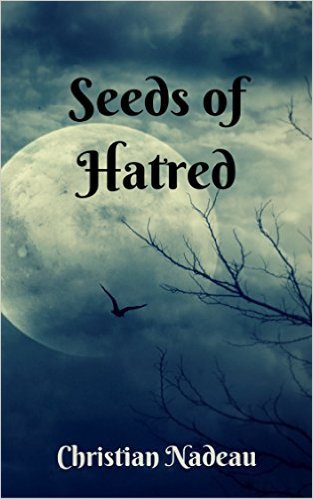 Seeds of Hatred is the debut novel of author Christian Nadeau.
Seeds of Hatred is the debut novel of author Christian Nadeau.
The lands of humanity are slipping into chaos. The Brotherhood of Khan reigns with an iron, tyrannical fist. The aristocracy displays hollow smiles and plots to regain lost power. The Fey lurk on the fringes, harboring centuries-old resentments. The Abraxans, servants of darkness, make ready to unleash a series of crippling attacks, while the Ezekans, cult of light, frantically struggle to weather the impending storm. Allegiances crumble, assassins eliminate targets, and fanatics burn it all. Behind the turmoil, ancients join the game. War is inevitable.
Into this bedlam of intrigue and infighting are thrust major players and unwitting pawns alike. Lieutenant Soren, eager officer of the Brotherhood; Marac, the brutal assassin; Lady Cullings, the scheming aristocrat; Elyas, heretic and ominous sorcerer; and Alex Ines, a fiery servant of the god of light. As bonds are broken and factions scramble for power, each finds their world shattered. Amidst total war, the struggle for their own morality becomes the greatest battle of all.
Seeds of Hatred is a novel that is clearly medieval fantasy, yet still wears many hats. It combines the depth and scope of Game of Thrones with the sinister grit of The Dark Tower series, which lands this book firmly in both the Epic Fantasy and Dark Fantasy categories.
The world-building skill displayed here is exceptional, and that is the novel’s most appealing quality. Nadeau brings an impressively intricate world of opposing factions and shifting loyalties to readers in Seeds of Hatred. The factions, cults, and peoples are clearly defined, as is the historical timeline leading up to the book’s events. This remarkable depth satisfactorily creates a fantasy world in which the reader has little trouble believing. The intrigue between and within factions is also handled deftly. A large portion of the enjoyment in Seeds of Hatred is pondering the motives behind the disparate characters and groups, and Nadeau plays them all off of each other very well.
There are several issues with Nadeau’s debut, however. First and foremost, Seeds of Hatred needs a serious overhaul in terms of its presentation, and, honestly, this is where a large number of the novel’s shortfalls stem. The cover is lackluster at best. (Books should not be judged by their covers, but, unfortunately, that is exactly what readers do.) Nadeau’s writing style is much too wordy, which repeatedly jars the readers out of the narrative, and long stints of passive prose are used to explain character development and plot. Some words – “interlocutor” comes to mind – are used over and over.
In essence, what this novel needs is some professional editing. Much of what is rough could be taken care of with a good, professional copy edit and narrative edit. A good editor is essential in pointing out where excessive wordiness needs to be cut, where passive voice is used, where the plot starts to drag, and where grammar needs some correction.
In summary, Seeds of Hatred is a well-envisioned narrative that falls short of its true potential. Nadeau is a budding writer however, equipped with some solid world-building skill and well on his way to discovering the essentials for an engrossing tale. Fantasy readers will want to keep an eye on Christian Nadeau for the future.
Review Overview
Design
Content
Editing
Get an Editorial Review | Get Amazon Sales & Reviews | Get Edited | Get Beta Readers | Enter the SPR Book Awards | Other Marketing Services






















Thanks for the review! I understand I have some more work to do and I’ll start some investigations on getting a better cover and editing services, though I can’t say yet when I’ll be able to go forward with it.